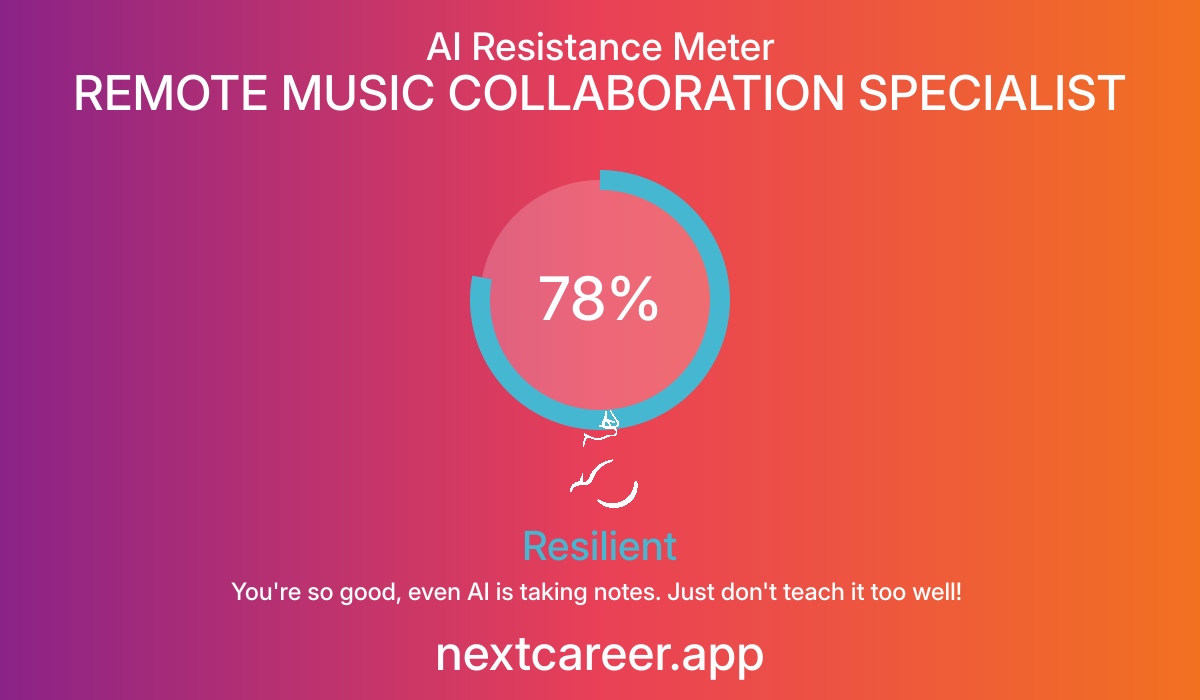AI Resistance Analysis
REMOTE MUSIC COLLABORATION SPECIALIST
REMOTE MUSIC COLLABORATION SPECIALIST
AI Resistance Score
AI Resistance Meter
Resilient
REMOTE MUSIC COLLABORATION SPECIALIST
You're so good, even AI is taking notes. Just don't teach it too well!
The role of a Remote Music Collaboration Specialist combines elements of creativity, emotional intelligence, and technical knowledge in music production. While AI technologies are advancing rapidly, particularly in music generation and production, the specialist role requires human touch and collaboration that is difficult for AI to replicate fully. In the near term, AI tools can assist in various tasks, but the unique nuances of human creativity and emotional expression render this role moderately resistant to AI threats, particularly in the long term.
The role of a Remote Music Collaboration Specialist combines elements of creativity, emotional intelligence, and technical knowledge in music production. While AI technologies are advancing rapidly, particularly in music generation and production, the specialist role requires human touch and collaboration that is difficult for AI to replicate fully. In the near term, AI tools can assist in various tasks, but the unique nuances of human creativity and emotional expression render this role moderately resistant to AI threats, particularly in the long term.
Key Factors
- Cognitive Tasks: While AI can analyze music trends and provide data-driven insights, the cognitive tasks involving creative decision-making in collaboration require human intuition.
- Emotional Intelligence: This role heavily relies on interpersonal skills and emotional intelligence, areas where AI still falls short.
- Physical Skills: The role may involve some technical skills related to music production tools, but these can be automated to an extent.
- Creative Thinking: The need for originality and the human touch in music creation and collaboration are areas where AI cannot easily compete.
Human Advantages
- Humans excel in emotional and contextual understanding, which is crucial for musical collaboration.
- Creativity and innovation in music are inherently human traits that AI cannot fully replicate.
- The ability to connect with other artists on a personal level to create unique art remains a human domain.
AI Vulnerabilities
- AI can generate music and suggest compositions, potentially reducing reliance on human input for certain tasks.
- AI can analyze music preferences and trends but lacks the ability to form genuine artistic partnerships.
Recommended Actions
- Invest in ongoing education about AI music tools and integration techniques.
- Foster skills in emotional intelligence and interpersonal communication to maintain an edge in collaborative aspects.
- Encourage creativity by experimenting with AI-generated outputs and using them as a springboard for new ideas.
As AI continues to evolve, Remote Music Collaboration Specialists might start to use AI as collaborative partners rather than replacements. Tools for composing and arranging may enhance the creative process rather than hinder it, enabling unique styles of collaboration that integrate human artistry with AI's capabilities. Over the next 20 years, the role might evolve to include more strategic oversight of AI tools in music production, requiring specialists to blend both artistic vision and technical acumen.

Why Calculate AI Resistance?
Understanding how AI-resistant your career is becoming increasingly important in today's rapidly evolving job market. Our analysis combines multiple factors including required human skills, technological adaptability, and future industry projections to give you a comprehensive view of your career's sustainability.